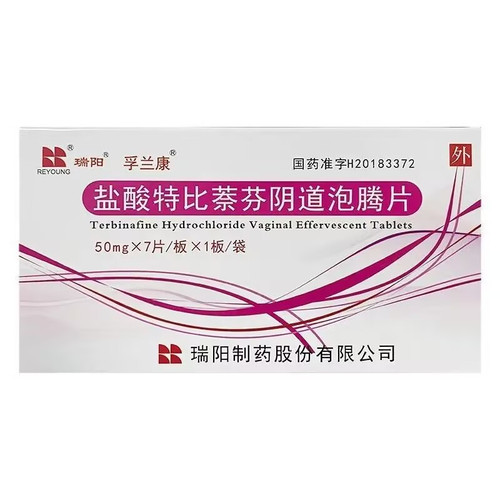Product Overview
【Drug name】
Generic name: Terbinafine Hydrochloride Vaginal Effervescent Tablets
Trade name: Dingke
English name: Terbinafine Hydrochloride Vaginal Effervescent Tablets
Chinese Pinyin: YanSuanTeBiNaiFenYinDaoPaoTengPian(DingKe)
【Ingredients】
The main ingredient of this product is terbinafine hydrochloride, and its chemical name is: (E)-N-(6,6-dimethyl-2-heptene-4-ynyl)-N-methyl-1-naphthylamine·hydrochloride
【Properties】
This product is a white or off-white tablet.
【Indications】
Vulvovaginal candidiasis.
【Usage and Dosage]
Take out one tablet before going to bed every night and insert it into the posterior fornix of the vagina. Use the medicine continuously for 1 week as a course of treatment.
【Adverse reactions】
The adverse reactions of this product include local irritation and allergic reactions, which manifest as irritation, vaginal itching, redness and swelling, etc. According to literature reports, the adverse reactions of other dosage forms of terbinafine (such as tablets, creams, etc.) include: 1. Gastrointestinal reactions. 2. Occasionally, aminotransferase increases or granulocytopenia occurs. 3. Topical use may cause local mild burning sensation, itching and other irritation symptoms or local skin dryness, sometimes accompanied by joint pain and myalgia. 4. It has been reported that mild skin reactions (such as urticaria and other rashes) may occur after medication, and very few patients have severe skin reactions (such as Stevens-Johnson syndrome and toxic epidermal necrolysis). 5. It has also been reported that very few patients have increased red blood cells in the urine after medication. 6. Rare taste changes.
【Contraindications】
It is contraindicated for those who are allergic to terbinafine or any component in the preparation. It is contraindicated for those with severe liver and kidney dysfunction.
【Precautions】
1. If abnormal liver function, allergic reactions, local vaginal pain, etc. occur, the drug should be discontinued in time. 2. Use with caution in patients with impaired liver and kidney function. Consult a doctor before use.
[Medication for special populations]
Children's precautions: There is still a lack of information on the use of this product in children
Precautions during pregnancy and lactation: Studies on pregnancy and mammals have shown that terbinafine has no adverse effects on the fetus and fertility. Since the experience of using this product in pregnant women is limited, pregnant women should not use it in principle unless the possible benefits outweigh any possible risks. Terbinafine can be excreted through breast milk, so mothers treated with this product should not breastfeed.
Precautions for the elderly: Elderly patients with impaired liver and kidney function should use this product with caution.
【Drug interactions】
Drug interaction studies have shown that terbinafine has little effect on the clearance of drugs metabolized by the cytochrome P450 enzyme system (such as cyclosporine, D860 or oral contraceptives). However, women using oral contraceptives should use this product with caution because a very small number of people may have menstrual disorders. In addition, hepatic enzyme inducers (such as rifampicin, etc.) can accelerate the plasma clearance of terbinafine, while hepatic enzyme inhibitors (such as cimetidine, etc.) can inhibit its clearance.
【Pharmacological action】
Pharmacological action Terbinafine hydrochloride is an allylamine drug with a wide spectrum of antifungal activity. It can specifically interfere with the early synthesis of fungal sterols and highly selectively inhibit the squalene epoxidase of fungi, thereby inhibiting the squalene epoxidation reaction during the formation of bacterial cell membranes, thereby achieving the effect of inhibiting and killing fungi. Toxicological study Repeated dose toxicity: Rats and dogs were given terbinafine hydrochloride orally for 1 year at a dose of 100 mg/kg/day, and no obvious toxic reactions were observed. At higher doses, certain liver and kidney toxicity was exhibited. Genetic toxicity: The results of in vitro and in vivo genetic toxicity experiments showed that terbinafine hydrochloride had no adverse effects on fertility and reproductive parameters, and no embryotoxicity (teratogenicity) was observed. Carcinogenicity: When mice were given terbinafine hydrochloride orally for 2 consecutive years, the dose reached 130mg/kg/day (bear mice) and 150mg/kg/day (female mice), no tumor formation or other abnormalities caused by administration were observed; when rats were given terbinafine hydrochloride orally for 2 consecutive years, the incidence of liver tumors in the high-dose (69mg/kg/day) group of bear mice increased, which may be related to the species-specificity of peroxisome proliferation, because the above changes were not observed in the carcinogenicity test in mice and other tests in mice, dogs and monkeys. Ocular toxicity: At higher doses, abnormal refraction of monkeys' eyes was observed (the non-toxic dose was 50mg/kg). These abnormalities were related to the presence of terbinafine metabolites in eye tissues, which disappeared after drug withdrawal and there were no histological changes.
【Storage】 Sealed, placed in a cool and dry place.
【Specification】 50mg/tablet (calculated as C21H25N·HCl)
【Packing specification】 Double aluminum packaging, 7 tablets per box.
【Expiration date】 24 months.
【Approval number】National Medicine Standard H20041876
【Manufacturer】Company name: Qilu Pharmaceutical Co., Ltd.






